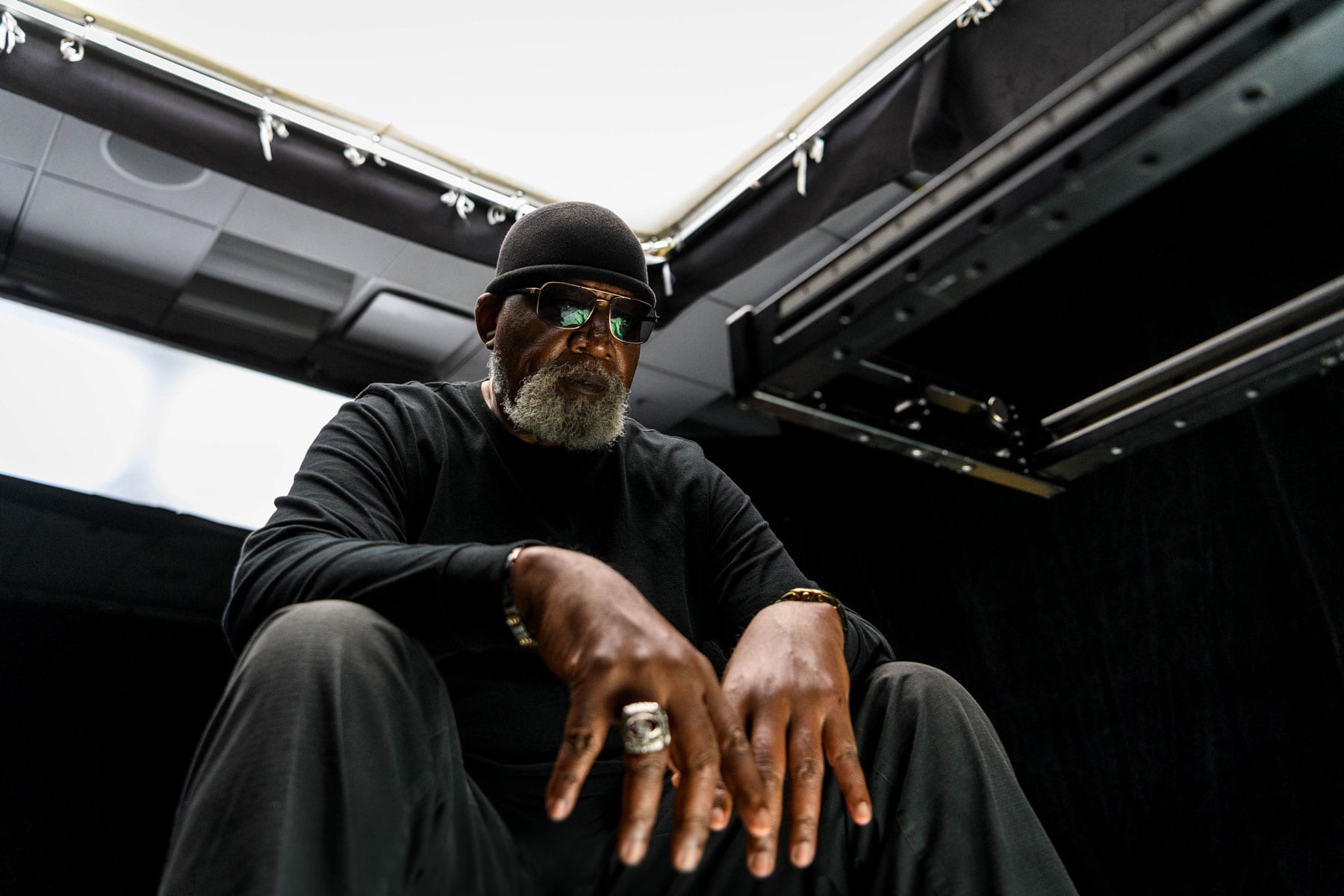Harry Edwards’ “The Stage” Nominated for 2022 Sports Emmy for Outstanding Short Feature

Harry Edwards, ’64 Social Science, ’16 Honorary Doctorate, chose SJSU as the backdrop for his upcoming Showtime film project as well as a short film, “The Stage,” that has been nominated for a 2022 Sports Emmy. Photo: Robert Bain
“The Stage,” a short film produced by noted sports sociologist Harry Edwards, ’64 Sociology, ’16 Honorary Doctorate, and documentarian Justin Parham, has been nominated for a 2022 Sports Emmy for Outstanding Short Feature. This is Edwards’ second Emmy nomination; his short film “A Letter to Bill Walsh” was nominated in 2018.
San José State University provides an iconic backdrop for the five-minute documentary, which explores the intersections of sports and social justice. The film opens with a wide shot of Edwards stepping into the spotlight at San José State’s Hammer Theatre.
“The stage is a place to be a star,” he says to the camera. “A place to be seen. But the stage can also be a platform, a place to be heard.”
During a recent visit to San José State’s Dr. Martin Luther King, Jr. Library, Edwards explained that it is important to highlight the university’s contributions to the sociology of sport, from writing his groundbreaking book “The Revolt of the Black Athlete” and co-founding the Olympic Project for Human Rights (OPHR) with Ken Noel, ’66 BA, ’68 MA, Sociology, to collaborating with Olympians Lee Evans, ’70 Physical Education, Tommie Smith, ’69 Social Science, ’05 Honorary Doctorate, and John Carlos, ’05 Honorary Doctorate. Smith and Carlos’ civil rights salute on the Olympic podium in 1968 created one of the most iconic images in sport history and generated international dialogue about the intersection of sports and social change. He also noted the work of pioneering Spartans Bill Walsh, ’54 BA, ’59 MA Kinesiology; Peter Ueberroth, ’59 Business Administration, ’86 Honorary Doctorate; and Yoshihiro Uchida, ’47 Biological Sciences, ’04 Honorary Doctorate.
“I want to make sure that San José State University is at the forefront [of this dialogue] because this didn’t happen at Notre Dame or Ohio State or Michigan or Stanford,” Edwards said. “We need to own and embrace that we started a new discipline. We created a new world view in terms of the possibilities of sport that reached all the way from San José to Nelson Mandela’s jail cell in South Africa. That movement started here.”
The film juxtaposes images of OPHR athlete-activists Smith and Carlos with footage from protests following the murder of George Floyd, as well as a collage featuring what Edwards describes as the various “waves” of athlete activism.
Edwards was on campus in mid-May to film excerpts of a forthcoming Showtime film project and capture audio for an online course scheduled to be released this fall. On May 17, he joined the SJSU Athletics Department at their annual awards ceremony to present one student-athlete with an inaugural Athlete-Activist Award, which includes a $1,000 scholarship, a signed copy of his seminal book, a 54-year-old OPHR button and a personalized tassel.
In the film, Edwards, who also helped establish SJSU’s Institute for the Study of Sport, Society and Social Change in 2017, described his role in founding the OPHR as the cornerstone of his mission to investigate how athletes can better use their platforms to promote human rights. As the camera pans around SJSU’s Olympic statue, Edwards says their message was a “clarion call for freedom and justice … a message and legacy that has endured more than half a century, as evidenced by the demonstrable courage, commitment and activism of today’s generation of athletes.”
“In 1967, Dr. Harry Edwards founded the Olympic Project for Human Rights at San José State University. For the next 55 years, he continued to explore how athletes can use their visibility for justice and equality for all,” said Walt Jacobs, dean of the College of Social Sciences.
“Here at SJSU, we respect and honor Dr. Edwards’ legacy by infusing a commitment to social justice throughout the university. As Dr. Edwards notes at the end of the short film, in an era of increased cultural and political strife, the world is watching to see if words lead to action. SJSU will continue our efforts to become a multicultural anti-racist institution.”
The National Academy of Television Arts and Sciences will announce the Sports Emmy winners at an in-person ceremony at Jazz at Lincoln Center’s Frederick P. Rose Hall in New York City on May 24.
Related Stories

What Are the Human Rights Implications of the Big Game? Two SJSU Events Explore the Relationship Between Human Trafficking and Major Events

Dive Into History with Nyle Monday

Invisible Skies Immersive Art Installation Features SJSU Creativity on January 31

